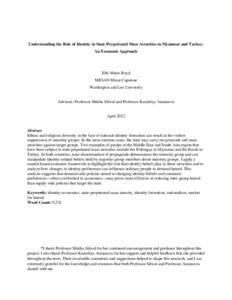Understanding the Role of Identity in State-Perpetrated Mass Atrocities in Myanmar and Turkey: An Economic Approach

View/
Author
Boyd, Elle Marie
Subject
Washington and Lee University -- Capstone in Middle East and South Asia Studies
Political atrocities
Minorities -- Economic aspects
Group identity -- Political aspects
Rohingya (Burmese people)
Kurds
Identity politics
Economics
Metadata
Show full item recordDescription
Capstone; [FULL-TEXT FREELY AVAILABLE ONLINE] Elle Marie Boyd is a member of the Class of 2022 of Washington and Lee University. Ethnic and religious diversity in the face of national identity formation can result in the violent suppression of minority groups. In the most extreme cases, the state may carry out genocide and mass atrocities against target groups. Two examples of groups in the Middle East and South Asia region that have been subject to state-perpetrated mass atrocities include the Rohingya in Myanmar and the Kurds in Turkey. In both countries, state-dissemination of propaganda dehumanizes the minority group and can manipulate identity-related beliefs held by majority-group members about minority groups. I apply a market-based economic framework to highlight the role that identity beliefs play in these atrocities and to analyze how changes in identity preferences can influence ordinary people to demand hatred. This analysis suggests that demand-side policies aimed at changing identity beliefs and consumer preferences -- often overlooked in economics -- may prove more effective at reducing inter-group hatred than supply-side policies that target the state.